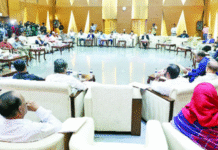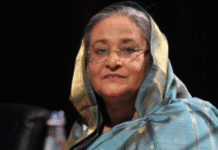
The interim government chief adviser, Professor Muhammad Yunus, on Saturday called upon all concerned to create a new civilisation, saying that the present civilisation had become disastrous for humankind.
‘Let us create a new civilisation. This civilisation has failed us. From environmental perspective alone it has turned out to be a self-destructive civilisation. From economic perspective it has led to extreme accumulation of wealth,’ he said while inaugurating the three-day Bay of Bengal Conversation at a hotel in the Dhaka city.
Iterating his theory of three zeros, the Nobel laureate underlined the need for creating a word of three zeros—zero net carbon emission, zero wealth concentration by introducing social businesses to solve people’s problems, rather than maximising profit, zero unemployment by turning young people into entrepreneurs, rather than jobseekers.
Around 200 speakers, 300 delegates and 800 participants from 80 nations, representing diverse voices across various sectors and geographies have joined the third edition of the annual geopolitical talks organised by the Centre for Governance Studies, a local independent think tank, with the theme ‘A Fractured World’.
Noting the theme of the conference, Yunus said, ‘We live in times marked by challenges and complexities. Whether it’s economic disparity, social injustice, or the threat of climate change, we face issues that are overwhelming.’
He put emphasis on building an economy where the fruits of technology and economic growth, instead of being monopolised by a privileged few, would be shared evenly among all.
Former Bolivia president Jorge Fernando Quiroga Ramírez and former Malaysia prime minister Mahathir Mohamad virtually joined the inaugural session with Centre for Governance Studies executive director Zillur Rahman in chair.
Referring to the student-led mass uprising that forced the fall of autocratic regime of Sheikh Hasina on August 5, professor Yunus told the foreign delegates that they were now in a city that barely a hundred days ago had experienced a unique political upheaval.
‘I welcome our international guests to a freshly emerged country, calling herself New Bangladesh to highlight the distance it wants to establish from the old Bangladesh. Hundred days back nearly 1, 500 students, workers and common demonstrators were killed by the old regime, nearly 20,000 were wounded,’ he mentioned.
He urged the foreign guests not to miss a historical opportunity to walk through the Dhaka streets, and watch the walls along the streets depicting the colourful graffiti carrying the emotions and aspirations of young people, painted ‘while there was a lull between the killing spree’.
This convention, Yunus said was more than just a meeting of minds. ‘It’s a testament to our shared resilience. Bangladesh has always been a land of dreams, hard work, and an unbreakable will. It is more so now, as the aspirations of the revolution are fresh in minds.’
He said that it was the work of millions of voices, almost the voices of the entire nation, —voices that demanded change, voices that continued to push us all to build a future based on human rights, freedom of speech, justice, and inclusion.
‘Our region is on the frontlines of climate change. Every year, our coastal communities face rising waters and shifting weather patterns that impact lives, homes, and livelihoods. This crisis is not something that can be put off for another day; it’s something that requires our immediate and united action,’ the chief adviser said.
Addressing the session, foreign adviser Md Touhid Hossain raised the Rohingya issue as a potential threat not only for Bangladesh, but also for the region and beyond.
He said that the crisis was not going to be resolved soon.
‘There is no light at the end of the tunnel and I don’t think it [Rohingya issue] is going to be resolved very soon,’ he said, adding that China, India and the United States had their own interest in the Bay of Bengal.
CGS chair Munira Khan also spoke at the inaugural session.
At a plenary session on ‘Shifting Tides: The Impact of Trump’s America on Asia and the Global South’, Ali Reaz, distinguished professor of Illinois State University, USA, said that the US policy about Myanmar was not clear.
He observed that the Rohingya crisis would continue to linger as over 1.2 million forcefully displaced Rohingya people, sheltered in Bangladesh camps, were not willing to return to their homeland Myanmar unless their citizenship was guaranteed.
Diplomats, academics, researchers, politicians and journalists from home and abroad are attending the geopolitical talks to conclude on Monday.
The conference this year features a dive into contemporary issues divided into five key thematic pillars of conversation—freedom of the press and the rising spread of misinformation, green energy and climate change, global trade and the world economic outlook, the landscape of global conflict and geopolitics, and the state of the world’s human rights.
new age









